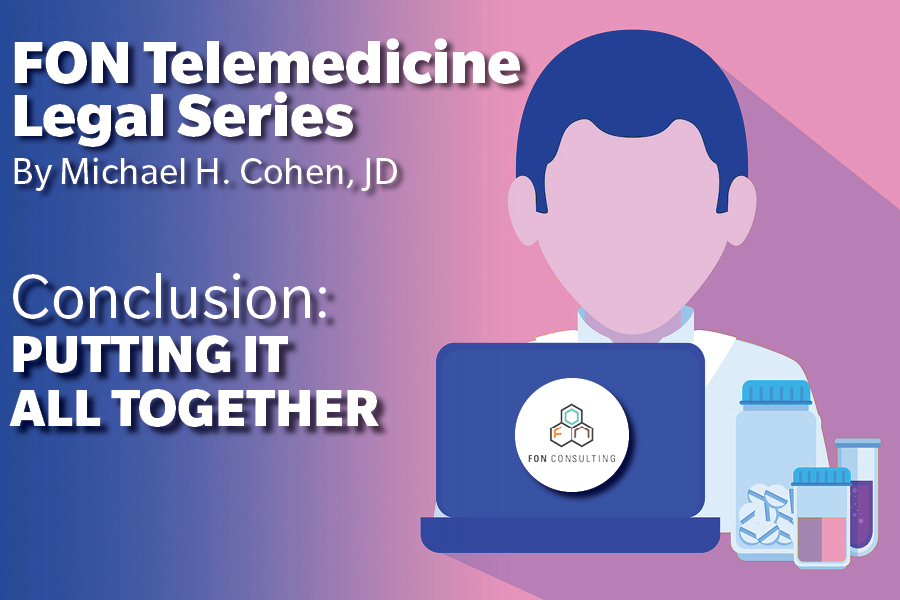Telemedicine Legal Series—Conclusion: Putting it All Together

In this Series:
Introduction
Part 1: Practice Issues
Part 2: Licensing Issues
Part 3: e-Prescribing
Part 4: Standard of Care Issues
Part 5: HIPAA Issues
Part 6: Mobile Medical Apps
Part 7: Unlicensed Practice, Fee-Splitting, and other Legal Hazards
Conclusion
A few years ago, telemedicine and telehealth burst on the scene, immediately challenging established legal frameworks built around brick-and-mortar practices.
The novelty forced healthcare practitioners and companies—and the lawyers who represent them—to work through the holes in the law, in an effort to bring new practices and products to market.
Today, there exists legislative and regulatory activity on telemedicine and telehealth in almost every state. Though medicine and various healthcare professions can be practiced online as well as in person is a given, the question remains: what does the law require to start and carry on such a practice in a compliant manner?
The Legal Landscape
In this Series, we’ve looked at:
- Practice issues—including the legal difference between offering education and information online versus online clinical practice.
- Licensing issues—including who has to be licensed, where, and when to ensure the clinical encounter lawful.
- Legal issues surrounding prescribing online—which often carry more stringent requirements—though some states are liberalizing the rules.
- Standard of care issues—and the position that the same standards of practice apply whether the encounter is physical or virtual.
- Privacy, confidentiality and security—including some key requirements of HIPAA, as well as state law.
- Mobile medical apps—the delivery of healthcare services via mobile devices, which in some cases is subject to FDA medical device regulation.
- Other legal issues—including corporate practice of medicine, fee-splitting, and advertising which often apply to telemedicine ventures.
Looking to the Future
While healthcare has broken out of the conventional, physical office visit and into the landscape of the Internet, this is only the beginning.
We’ve already established that beyond telehealth or ¬e-health, we now have mobile health—healthcare delivered via smartphones. Some refer to the whole category of healthcare outside the physician’s office as ‘digital health’ or as ‘connected health’.
Enjoying this article? Subscribe and get our latest, delivered straight to your inbox.
Whatever the terminology, expect continuing evolution. Virtual or augmented reality is an up-and-coming technology predicted to be widely deployed in healthcare.
Thus far, healthcare legislators, regulators, and lawyers have been able to adapt and innovate to make healthcare law fit new models of care. Practitioners and companies have paid attention in efforts to remain within the boundaries of law while expanding their offerings and models of care delivery.
Because industry innovation moves faster than laws can change, new healthcare practices and models have an edge. This is where solid legal counsel can augment the effort of savvy clinicians and executives bringing health and wellness services and products to the market in ways that enhance human health and potential.
Contact the Michael H. Cohen Law Group for a telemedicine legal consult that fits your particular business model.
Reading this article does not create an attorney-client relationship with its author or with the Michael H. Cohen Law Group. This is an informational and educational piece; it does not constitute legal advice. If you’d like legal advice, consult an attorney for advice specific to your situation.
About FON
FON is a leading integrative health and medicine business development and strategy consulting firm. FON specializes in custom solutions for growing patient volume, developing programs, and increasing product sales. Our practical business models are driven by innovative marketing, clear messaging, and customer engagement via branded storytelling.
Contact us today to schedule a complimentary 30-minute consultation to discuss your business development or personal brand needs.






















